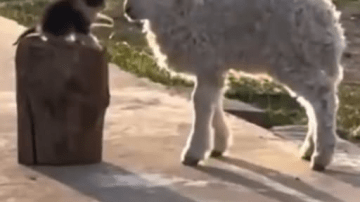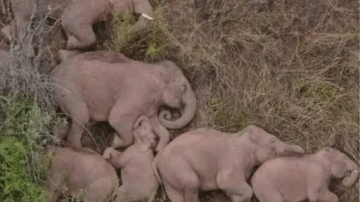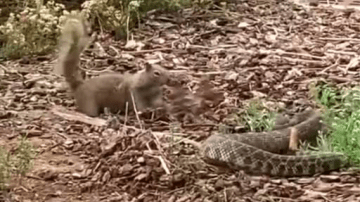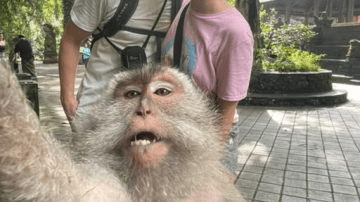It was supposed to be an ordinary morning—a quiet walk before sunrise, the kind fathers take to clear their minds. The air was crisp, heavy with the scent of pine and mist rising off the railway tracks. Birds hadn’t yet begun their song. The world felt still. And then, from that silence, came a sound that would change everything—a desperate cry, high-pitched and full of fear.

That cry didn’t belong to a human. It came from the woods just beyond the rails. What happened next became one of those rare moments that remind us what real courage looks like—an act that no one planned, no one expected, yet everyone who witnessed it would never forget.
The Morning That Tested a Father’s Instinct
Michael Turner, a 42-year-old father of two, was jogging near the old train tracks outside his small town in Vermont. It was his morning ritual, something that helped him escape the noise of daily life. But that day, as he crossed the worn wooden bridge, something caught his attention—a trembling deer, tangled in wire near the edge of the track.
The animal’s eyes were wide, chest heaving, legs kicking helplessly. And from a distance, Michael could already feel the vibration under his feet. A train was coming.
He froze for a split second, torn between fear and instinct. The whistle echoed through the valley—long, sharp, and terrifying. Most people would have turned away, believing there was no time. But Michael ran toward the sound.
A Race Against Time
The deer struggled harder as the rumble grew louder. Michael’s heart pounded in his chest, the sound of the train mixing with his own breath. He reached the animal and dropped to his knees, hands shaking as he tried to free it from the wire.
It wasn’t easy. The wire was twisted tight around the deer’s back leg. Every second felt heavier. He could see the headlight in the distance now—a bright, blinding glare cutting through the fog.
“Come on, come on…” he muttered under his breath, pulling with all his strength. The deer bleated, panicked and exhausted. Finally, with one desperate yank, the wire snapped. The animal bolted into the woods, stumbling but free.
Michael jumped off the track and fell onto the gravel just as the train roared past, a wall of sound and steel that shook the ground beneath him. He covered his face, heart racing, realizing how close he’d come.
For a moment, everything stopped. The train vanished down the line, and silence returned. The deer was gone. And so was the fear—replaced by something quieter, deeper. Relief.
Unspoken Rescues: The Power of Instinct and Compassion
When local news picked up the story, they called him a hero. But Michael refused the title. “I just did what anyone would do,” he told them. But here’s the truth: most wouldn’t.
There’s something profound about the human instinct to protect, even when logic says run. Scientists call it the empathy reflex—the deep, often subconscious drive to relieve another creature’s suffering, even at great personal risk.
It’s what makes a parent step in front of danger. It’s what drives a stranger to act in seconds that could mean life or death. And it’s what Michael embodied in that single, unforgettable morning.
The Ripple Effect of Courage
After the rescue, word spread through the small Vermont community. Neighbors who had never spoken to Michael stopped by to thank him. One local student even wrote an essay about “the man who saved the deer,” describing how it inspired her to volunteer at an animal shelter.
That’s the beauty of compassion—it multiplies. One brave act can awaken empathy in others, creating ripples that reach far beyond the original moment.
A study from Harvard once showed that witnessing kindness can increase the likelihood of someone performing their own good deed by up to 30%. What Michael did wasn’t just an act of courage—it was a spark that reignited something in everyone who heard his story.
What This Story Teaches About Real Heroism
This wasn’t a movie scene. There were no cameras rolling, no dramatic music, no audience to cheer. Just a man, a trapped creature, and a moment to decide who he wanted to be.
Real heroism often hides in quiet decisions—ones no one may ever see. And that’s what makes them powerful.
Think about your own life for a second. Have you ever faced a moment where you had to act quickly, without knowing if it would work out? Maybe you helped a stranger, comforted someone who was crying, or spoke up when others stayed silent. Those are your unspoken rescues—the kind that shape who you are when no one is watching.
The Emotional Science of Helping
Why do people like Michael risk their safety for others? Research suggests that empathy activates the same pleasure centers in the brain as eating or listening to music. Helping releases oxytocin—the “bonding hormone”—which can lower stress and increase feelings of connection.
In fact, here’s how the biology of compassion breaks down:
| Human Response | What Happens in the Brain | Emotional Effect |
|---|---|---|
| Witnessing suffering | Amygdala triggers alertness | Heightened empathy |
| Deciding to help | Prefrontal cortex evaluates risk | Boosts moral satisfaction |
| Completing the rescue | Dopamine and oxytocin release | Relief, joy, sense of purpose |
So while logic might scream “stop,” the heart whispers “go.” And sometimes, that whisper saves a life.
Case Study: The Aftermath of Courage
A few weeks after the rescue, Michael’s daughter, Emma, asked him, “Daddy, were you scared?”
He smiled. “Yes, sweetheart. I was terrified.”
She thought for a moment, then said, “But you still did it.”
That small exchange stuck with him. He realized that courage doesn’t mean being fearless—it means acting despite fear. And that’s a lesson his children, and perhaps all of us, need to hear more often.
Case Study: Inspired by the Story
Months later, a local veterinarian shared that donations to the wildlife rehabilitation center had nearly doubled after the story went viral. People wrote messages like, “If that father can save one deer, maybe I can save one too.”
Kindness, it turns out, is contagious.
Lessons from a Single Moment of Bravery
- Fear doesn’t mean stop. It means you care enough to risk.
- Empathy transcends species. Life recognizes life, no matter the form.
- One act can inspire hundreds. Courage invites imitation.
- True heroes don’t seek attention. They act because it’s right.
- Love moves faster than fear. The heart always finds a way.
- Children learn from example. Every act teaches more than words ever could.
- Courage is contagious. What starts as one rescue becomes a movement.
The Spiritual Side of Rescue
Michael’s story also invites a deeper reflection. What if every act of compassion we show—whether to a person, an animal, or even ourselves—is part of a greater balance in the world?
Every unspoken rescue, every quiet moment of care, restores a small piece of humanity. In a world often driven by fear, these moments of love become our reminders that hope still breathes.
And maybe, that’s the truest form of saving—bringing life not just to others, but to our own spirit.
How You Can Become an “Unspoken Rescuer”
You don’t have to face a speeding train to make an impact. Every day offers opportunities for courage:
| Action | Example | Potential Impact |
|---|---|---|
| Offer time | Help at a shelter or community kitchen | Builds empathy and connection |
| Speak kindness | Compliment or comfort someone struggling | Reduces loneliness |
| Protect nature | Rescue, recycle, or report environmental harm | Preserves life |
| Act on instinct | Trust compassion over hesitation | Inspires others to follow |
Each time you act, you strengthen the emotional muscles of empathy—creating small, silent miracles that no one may ever see, but that matter deeply.
The Quiet Ending
The deer was never seen again, but Michael likes to believe it survived, maybe even thrived back in the wild. Sometimes, when he jogs by the same tracks, he looks toward the woods and smiles.
He doesn’t think of himself as a hero. He just remembers the eyes of the frightened animal, the roar of the train, and the moment everything slowed down long enough for one heart to save another.
And maybe that’s what “unspoken rescue” really means—acts of love that need no applause, only purpose.
Final Thought
Courage doesn’t wait for the perfect moment. It acts in the chaos, in fear, and in silence. A father saving a deer seconds before a train collision isn’t just a story—it’s a reminder of what we’re all capable of when love is louder than fear.
The world doesn’t need more heroes who shout. It needs more people who act quietly, compassionately, and without hesitation.
Because sometimes, the most powerful rescues are the ones no one ever sees.
This article is for informational purposes only and does not replace professional advice. Readers are encouraged to act safely and compassionately in all rescue situations.





